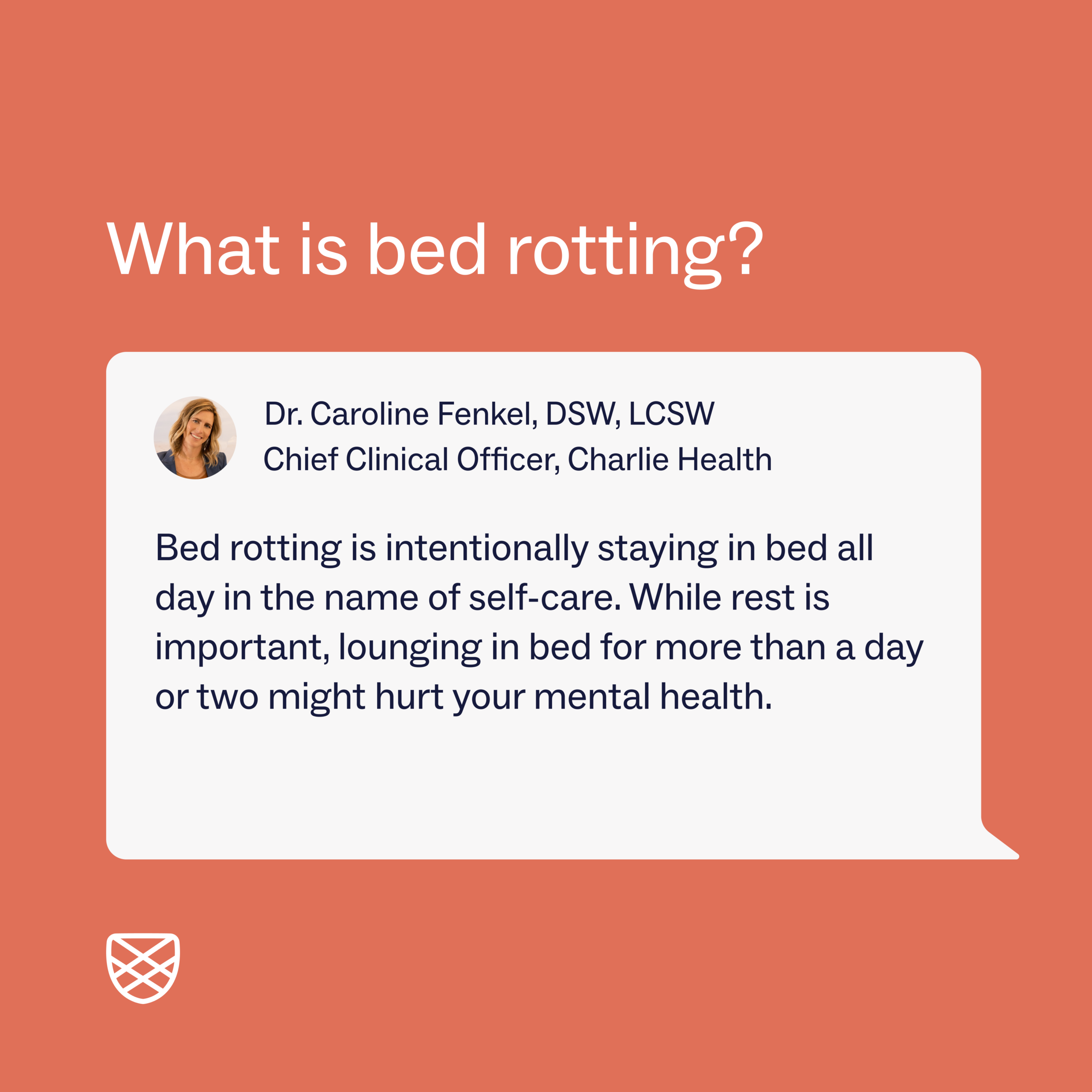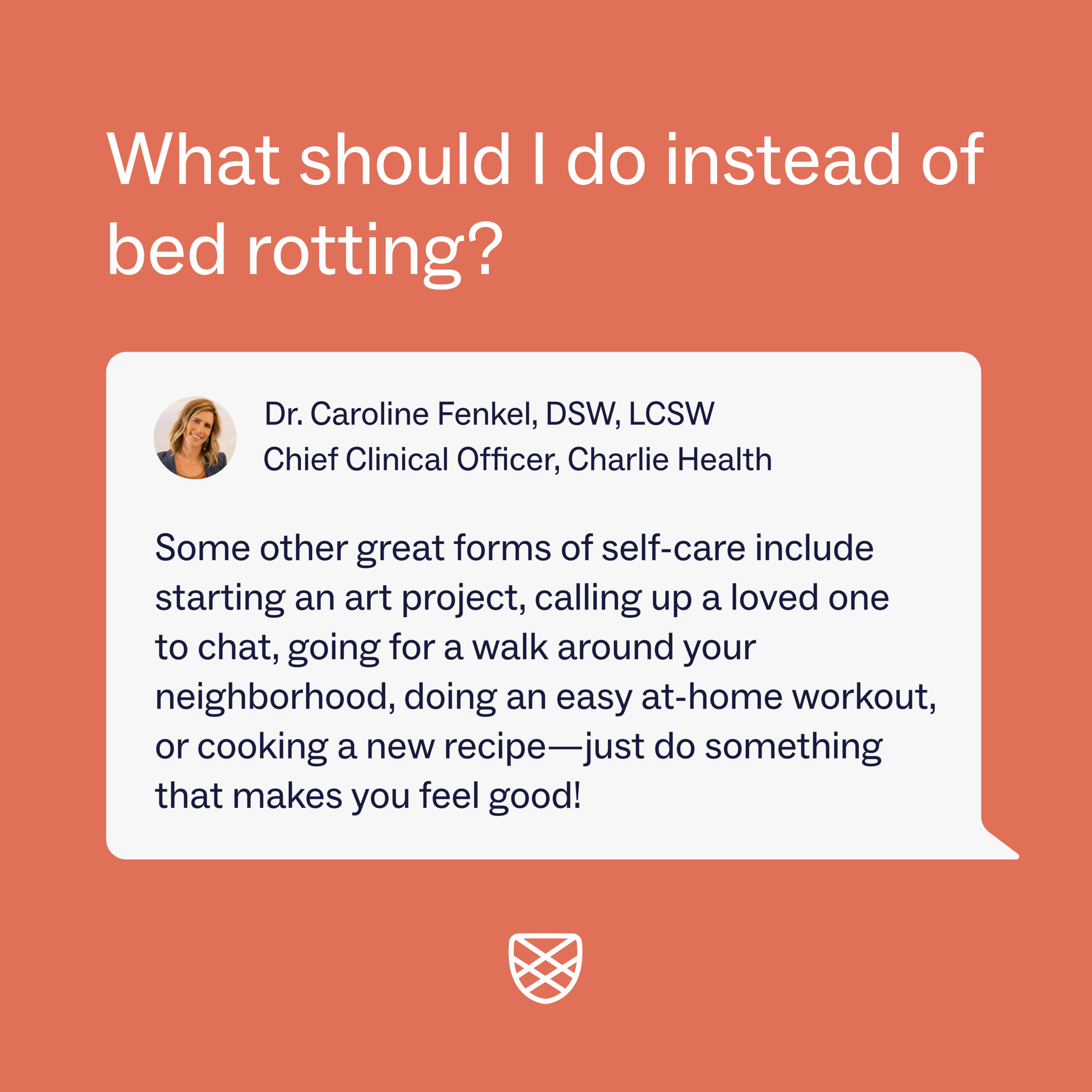
Table of Contents
What Is Bed Rotting — And Is It Bad for You?

Written By: Ashley Laderer

Clinically Reviewed By: Dr. Don Gasparini
August 5, 2023
8 min.
As “bed rotting” continues to rise in popularity, it’s important to understand why we do it and when the behavior is a red flag. Read on to learn more.
Learn more about our Clinical Review Process
Table of Contents
Life is hard, but lying in bed doing absolutely nothing is easy. If all you feel like doing in your free time these days is getting under the covers and binge-watching shows or scrolling social media for hours on end, you’re definitely not the only one. Enter: “bed rotting.”
Bed rotting is something you may have been doing for years, but lately, thanks to Gen Z social media users, the act has a name, and it’s becoming more and more popular and normalized. If it’s any indication, #Bedrotting is a TikTok trend with a whopping 11 million views and counting.
Here’s what you need to know about bed rotting, concerns around the trend, and when to seek healthier self-care alternatives.
What is bed rotting, and why are people doing it?
Bed rotting involves staying in bed alone doing things that require little to no effort for long periods of time. It’s not just taking a quick 15-minute TikTok scroll –– it’s spending hours or even all day isolated and sedentary.

“Bed rotting is when someone makes a conscious choice to be alone in their bed rather than participating in an activity that requires more effort, socialization, or energy,” says licensed mental health counselor Nicole Maselli.
In this chaotic day and age, people may engage in bed rotting because it’s a welcome escape from the real world and any difficult emotions they may be having. It can feel much easier to zone out in bed scrolling social media or watching shows than to face tough feelings or do something more productive –– which is why bed rotting is so enticing.
Given the generation’s mental health crisis and collective trauma, it makes sense that Gen Z social media users have pioneered the bed rotting trend. In fact, Maselli says you can view bed rotting as a trauma response.
“When we feel unsafe from conditions in our personal lives as well as conditions in society, our body perceives this as a threat, much like if we were in physical danger, and goes into a trauma or stress response — fight, flight, or freeze,” Maselli explains. “Bed rotting can be seen as a freeze response in which people are feeling unsafe and perhaps on a conscious and unconscious level, they’re choosing the safety of their bed.”
It’s important to note that while most people define trauma as one big traumatic event someone experiences or a “big T trauma,” ongoing stressors or “little T trauma” is also valid. Ongoing stress can be stored in the body, leading to trauma responses such as the freeze response, or bed rotting, says Maselli.
Because it’s such an easy escape from trauma, emotions, and responsibilities, bed rotting is seldom a one-off occurrence, and it can quickly become a habit you fall into if you aren’t mindful of the behavior. Furthermore, while Gen Zers might be the most open about their inclination to bed rot, they aren’t the only people who can get sucked in. Bed rotting can be appealing to people of all ages and can sometimes cause more harm than good.
Join the Charlie Health Library
Get mental health updates, research, insights, and resources directly to your inbox.
You can unsubscribe anytime.
Is bed rotting a form of self-care?
It’s no secret that self-care is important for everyone, regardless of what mental health struggles they may or may not face. However, can we really consider bed rotting self-care? Experts say maybe, in small quantities.
“Rest is really important. Often our society pushes hyper-productivity, doing the most, working the most, trying to make the most money, or using up your energy to do things with some tangible outcome,” Maselli says. Some people view bed rotting as a push against this hustle culture in today’s society and choosing rest, instead –– which in and of itself is okay.
However, it really depends on what you are doing in bed, for how long, and what led you to get into your bed in the first place, says licensed clinical social worker Samantha Strong. For example, Strong says it makes sense if you need a little break from a busy socializing schedule with peers or family or are super burnt out from work. However, if you find you’re scrolling through Instagram and TikTok for hours on end, multiple days in a row, and using this behavior as an ongoing escape from unpleasant emotions, this is a sign that the behavior is problematic.
Additionally, rest can veer into unhealthy territory if too much time is spent in bed at the expense of other self-care activities. Bed rotting is especially concerning if you feel like you can’t control how much time you’re in bed or if you feel distressed about how much time you’re spending in bed, says Maselli.
Are there any concerns around bed rotting?
In short: Absolutely. If your bed rotting habit is excessive, it can take a hit on your physical health and mental health. Firstly, when you choose to bed rot, you’re choosing to isolate yourself from others, whether that’s your family or friends. Isolation, particularly a lot of it, can lead to an increased risk of anxiety and depression. Furthermore, getting used to spending so much time alone could even make you nervous at the thought of social plans and lead you to avoid them. Isolation and anxiety can create an ongoing cycle that fuels each other.
Even though you’re spending lots of time in bed when you bed rot, the habit can actually hinder you from getting proper sleep, impacting both your physical and mental well-being. “You might start to associate your bed with activity instead of a place to rest and sleep, which can make it difficult to go to sleep at night,” Strong says. Not to mention, if you’re scrolling at night, your phone’s blue light can mess with your circadian rhythm, or sleep-wake cycle, making it harder for you to get tired and fall asleep.
Additionally, if you’re bed rotting in excess, you probably aren’t getting much movement in. “Studies have shown that almost any form of physical activity actually has stress-busting benefits and can counter symptoms of anxiety and depression, so if you're not exercising, you're not getting any of those endorphins –– your brain's feel-good chemicals,” Strong says. “If you're bed rotting a lot and not engaging in much physical activity, becoming sedentary can become a habit that's difficult to break, and your brain won't be getting the same amount of blood flow it would otherwise.” On top of this, research has found links between physical inactivity and mood changes or depression.

If your bed rotting includes plenty of time on social media, this can result in its own mental health consequences, such as increased feelings of isolation or loneliness, fear of missing out (FOMO), and decreased self-esteem, to name a few. Plus, social media gives you easy hits of dopamine, which is another feel-good hormone linked to your brain’s reward system. When you’re getting dopamine fixes from social media, you may rely on this as your main source of dopamine rather than healthier methods, says Maselli.
Another general risk of bed rotting is that since it’s become so normalized and is so effortless, you can become dependent on the habit., Too much bed rotting can make it seem like staying in bed is your only option to cope with difficulties, despite the availability of plenty of other coping skills Maselli says.
The bottom line: There’s an undeniable link between excessive bed rotting and mental health. “If you're finding that you're bed rotting for more than one or two days at a time, canceling social meetings and isolating from others, feeling very low, and noticing a pattern in how often and how long you stay in bed, this could be a sign that your bed rotting has led to symptoms of anxiety or depression –– or that your desire to bed rot is because you're experiencing a mental health struggle,” Strong says.
Disrupted sleep
Reduced physical activity
Excessive social media use
Limit coping skills
Sign of mental health struggle
Excessive bed rotting can lead to linking the bed with being active instead of resting, and over-expose people to the blue light emitted by screens, potentially disrupting the sleep-wake cycle.
Lack of physical activity due to bed rotting can hinder stress relief, endorphin release, and blood flow, potentially leading to mood changes.
Spending too much time on social media while bed rotting can lead to feelings of isolation, FOMO, lowered self-esteem, and reliance on dopamine from online interactions.
Bed rotting might create the impression that staying in bed is the only way to deal with challenges, even though there are actually many other coping skills available.
Bed rotting could be a sign of anxiety, depression, or another mental health challenge if you’re frequently skipping social plans or feeling down while in bed.
Healthy self-care alternatives to bed rotting
While a little bit of lazy day bed rotting here and there is okay, it’s super important to also practice self-care activities that will benefit your well-being. Some ideas include:
- Exercising
- Getting creative by making art or music
- Practicing mindfulness and meditation
- Doing breathing exercises
- Socializing with friends and family
- Calling up a loved one to talk
- Practicing gratitude
- Journaling
- Unplugging from social media
- Eating healthy
- Getting enough sleep
If it feels really hard for you to do any of these things, show yourself self-compassion and grace. Don’t beat yourself up for this behavior. Maselli stresses the importance of taking baby steps and being patient. If getting out of bed and going for a walk feels like an insurmountable task, start really small.
For example, you can just put your phone down next to you and engage in a tiny bit of movement while you’re still in bed, like moving your eyes back and forth to combat eye strain, rolling the wrists and ankles, and stretching your fingers. Once you learn that you have the strength to do these little things, you can gradually work your way up to slightly bigger activities.
Additionally, Maselli suggests enlisting an accountability buddy –– another person you can check in with regularly to inspire each other to engage in healthier self-care practices and coping skills.
This isn’t to say you have to give up in-bed scrolling or binge-watching entirely. Just make sure you’re also engaging in healthy activities and taking care of your overall well-being. Remember the importance of moderation and balance. “If you feel like you need a break from being around others, try doing something more active,” Strong says. “You can always spend an hour or two afterward in your bed letting that glow of endorphins wash over you –– and you'll probably feel a lot better for it both physically and mentally.”

How Charlie Health can help
If you find yourself bed rotting excessively or aren’t able to use coping skills other than bed rotting, Charlie Health can help.
Charlie Health is the largest virtual mental health provider for Gen Z teens and millennial young adults with serious mental health conditions. Our virtual intensive outpatient program (IOP) provides personalized care for people dealing with a wide range of mental health conditions, including anxiety and depression and related symptoms, like bed rotting.
Whether you’re exploring treatment options for the first time or seeking extra support, Charlie Health provides individualized and evidence-based mental health care in a safe, supportive space.
Fill out this short form to get started today.
References
https://www.claritytherapynyc.com/nyc-therapist/nicole-maselli-lmhc/
https://www.sleepfoundation.org/bedroom-environment/blue-light
https://sitn.hms.harvard.edu/flash/2018/dopamine-smartphones-battle-time/
https://www.nimh.nih.gov/health/topics/caring-for-your-mental-health
https://www.claritytherapynyc.com/nyc-therapist/nicole-maselli-lmhc/





